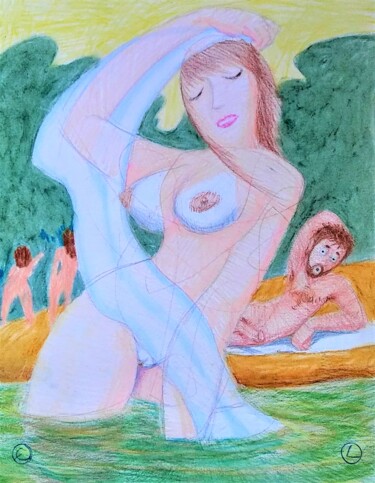


Faites-nous savoir si vous souhaitez voir plus de photos de cette œuvre !
- Arrière de l'œuvre / Côté de l'œuvre
- Détails / Signature / Surface ou texture de l'œuvre
- Œuvre en situation, Autre...
Venus Emerges (2022) Dessin par Edwin Loftus
Plus d'info
- Emballage (Enveloppe) Toutes les œuvres sont expédiées soigneusement protégées et assurées, avec un transporteur premium.
- Suivi Suivi de commande jusqu'à la livraison à l'acheteur. Un numéro de suivi vous sera fourni afin que vous puissiez suivre le colis en temps réel.
- Délais Livraison dans le monde entier en 3 à 7 jours (Estimation)
Plus d'info
- Certificat d'authenticité en ligne traçable Les certificats d'authenticité peuvent être vérifiés en ligne à tout moment en scannant le code de l'œuvre.
- Certification de la cote artiste Les experts étudient l'œuvre et la carrière d'un artiste puis établissent une cotation moyenne indépendante et fiable. La cotation moyenne permet de situer l'artiste sur une gamme de prix pour une période donnée. Les experts peuvent également être sollicités pour établir une estimation plus précise pour une œuvre en particulier.
Plus d'info
Paiement 100% sécurisé avec un certificat SSL + 3D Secure.
Plus d'info
Impressions "Fine-art" sur papier
Il s'agit d'un processus d'impression sur papier d'art utilisant des encres pigmentaires de très haute qualité et imprimé en très haute définition. Son niveau de conservation est exceptionnel (plus de 100 ans), sa qualité, sa profondeur et sa richesse de nuances dépassent celles de l'impression photo classique sur papier argentique.

Finition brilliante
Outre son épaisseur exceptionnelle, le papier fibre est composé d'une base d'alpha-cellulose sans acide et il est recouvert de sulfate de baryum, et d'une couche microporeuse améliorant l'absorption des pigments lors de l'impression. Arborant une couleur blanc pur, ne jaunissant pas à la lumière, ce papier est spécialement conçu pour être durable dans le temps. Il est utilisé par les principaux musées du monde entier car il offre une excellente résolution et un rendu de couleurs profondes et denses.
Impression d'art "Fine Art" - Finition brillante sur papier à base de fibres 325 g.

Nos impressions et reproductions haut de gamme
ArtMajeur n'utilise que des papiers naturels au pH neutre, résistants et de haute qualité, sélectionnés par des papetiers de renom!
Une attention constante est portée par notre maître imprimeur, que ce soit en terme de contrôle des couleurs ou de respect de la chaîne graphique. Notre exigence de qualité élevée est un atout majeur pour les tirages d'art encadrés ArtMajeur.
Pour les artistes! Vous aidez les artistes à vivre de leur travail. Leurs royalties leur sont reversées chaque fois que vous achetez leurs impressions.
A propos de nos impressionsAchetez une licence pour utiliser cette image pour votre site Web, votre communication ou pour vendre des produits dérivés.
Usage: Licence Web
| 1164 px | ||

|
1500 px |
| Dimensions du fichier (px) | 1164x1500 |
| Utilisation mondiale | Oui |
| Utilisation sur multi-support | Oui |
| Utilisation sur tout type de média | Oui |
| Droit de revente | Non |
| Nombre maximum d'impressions | 0 (Zero) |
| Produits destinés à la vente | Non |
Téléchargez immédiatement après l'achat
Cette image est disponible pour téléchargement avec une licence: vous pouvez les télécharger à tout moment.
Restrictions
Toutes les images proposées sur ArtMajeur sont des œuvres d'art originales créées par des artistes, tous les droits sont strictement réservés. L'acquisition d'une licence donne le droit d'utiliser ou d'exploiter l'image selon les termes de la licence. Il est possible de faire des modifications mineures comme recadrer, ou recentrer l'image pour qu'elle s'adapte parfaitement à un projet, toutefois, il est interdit d'apporter toute modification qui serait de nature à porter atteinte à l'œuvre originale dans son intégrité (modification des formes, distortions, découpage, changement des couleurs, ajout d'éléments etc...), à moins qu'une autorisation écrite soit obtenue au préalable auprès de l'artiste.
Licences personnalisées
Si votre utilisation n'est pas couverte par nos licences standard, contactez-nous pour une licence personnalisée.
Banque d'images artistiques-
Œuvre d'art originale (One Of A Kind)
Dessin,
Pastel
sur Carton
- Dimensions Hauteur 14in, Largeur 11in
- État de l'œuvre L'œuvre est en parfait état
- Encadrement Cette œuvre n'est pas encadrée
- Catégories Dessins à moins de 5 000 $US Symbolisme
In most ancient civilizations of which we have written records, males were the economic and political center of the family and social order. Views differed greatly from culture to culture, but women, were often viewed as a form of inferior part of humanity, entitled to protection, sometimes with very important rights that verged on superiority in the right settings, but often as possessions of the males with authority over them. Systems equivalent to bride prices and dowries existed around the world.
A bride price, is the sales value of a daughter, usually paid to her father for the right to make her a man's wife. This doesn't mean that a daughter did not have value as a family member and as a person. in fact, for those reasons and her value as a worker in the household and business, fathers, as the controllers of the household, were considered to be owed compensation for the loss they would incur. The family was still likely to take into account the ability of the payee to provide a secure home for their daughter and to treat her humanely. A man of ill-repute might well be turned down, even if he exceeded the bride price asked.
A dowry is the treasure a daughter brings with her as her own possessions and sometimes a sweetener to the exchange of custody. A wealthy daughter's dowry might include large sums of cash and land of economic value. Dowries might be frittered away, but they have often been the property of the wife, protected in case of divorce or inheritance disputes upon the husband's death. A second form of dowry is the 'bride price' a father pays the husband and his family to take on the expense of keeping his daughter. Failure to pay as promised or paying what the family thought too little could place the bride in jeopardy of being cast out or killed.
A third form of bride selling were marriages of alliance. The joining of two families' bloodlines could form a bond of cooperation or non-aggression, the latter particularly of interest to kings and their kinfolk.
In this sort of context and its many variations, romantic interest was expected to result from the marriage, rather than the other way around. And of course, there were many instances of romantic attractions forming between persons other than the person's spouse.
Romantic love was a plus when it occurred between married people, and a bane to social order otherwise, particularly when it led to infidelity and either the production of unwanted children or interfered with the production of heirs. In Europe the rebirth of importance of romantic love began during the Renaissance and into the Enlightenment, generalized through the media of songs, plays, and romantic literature, the mass-media of their day.
Plays like, Romeo and Julliet, were slightly scandalous and very appealing because exposed the alternative and its potential tragedy in a world in which The Taming of the Shrew was just as understandable. Even today, there are countries where bride-selling and dowries that purchase the security of the bride are still practiced and there are those among us that believe couples should be matched based on economic or genetic characteristics. Over the last few decades dozens (or more) movies have been released based on the premise that if someone doesn't get married soon, they'll lose their inheritance. These films are successful because the person they choose as a fake spouse always ends up being their true romantic partner, but the interesting thing is that such stories stand so perfectly with one foot in the pre-romantic era and one foot in the romantic era, and people all over the world accept the premise, because those people are rich and have so much more riding on such things, (no one cares if a pauper or middle-class shop owner's son is denied their inheritance).
A few centuries of infatuation with romance is far from a foundation for an argument that the world has changed. But a few millennia of romantic tales that excite our imaginations and yearnings are an argument for a benefit to be had if and when such a change occurs.
My personal belief is that mutual sexual attraction and mutual romantic attraction are like the two ends of an arrow. The "point" of sexual attraction leads us there and enables us to stick with our target. But the fletching of romantic attraction is what guides us to the right target and the part that remains visible long after the point has done its job.
That is why I have done so many drawings on this subject and tend to mix sex and the potential for love in them. Like Jack and Jill, they'll go up the hill and will either return with a pail of water between them or will come tumbling down.
Thèmes connexes
Edwin Loftus est un peintre et dessinateur américain né en 1951. Son intérêt pour l'art a commencé à l'âge de 4 ans lorsqu'il a décidé de dessiner quelque chose de réel plutôt que de travailler à partir de son imagination.
Enfant, il excellait dans le dessin et à l'adolescence, il commença à expérimenter la peinture à l'huile. Au collège, il a suivi des cours d'art et d'histoire de l'art et s'est rendu compte que le véritable art n'avait rien à voir avec la qualité du dessin ou de la peinture, mais qu'il devait avoir l'ambition de repousser les limites et d'élargir l'expérience visuelle.
Il a également étudié la philosophie, la psychologie et l'histoire et s'est rapidement rendu compte qu'il ne s'agissait que d'un autre établissement artistique essayant de défendre son industrie élitiste et son système de récompense. Leurs compétences étaient presque inexistantes, ils ne connaissaient rien à la psychologie, à la perception ou à la réponse aux stimuli, et ils étaient des extensions du système de croyances qui ont fait du communisme, du fascisme et d'autres formes de totalitarisme des forces destructrices dans le monde. Ils croient littéralement que l'art ne devrait pas être accessible aux êtres humains ordinaires, mais seulement à une élite « sophistiquée » suffisamment pour le comprendre.
Edwin Loftus s'est rendu compte que les empereurs de l'art n'avaient pas de vêtements, mais ils étaient toujours les empereurs. Doué en art, il a travaillé dur pour acquérir cette compétence. Il a donc trouvé d'autres moyens de gagner sa vie et a vendu quelques œuvres de temps en temps. Pendant soixante ans, de nombreuses personnes ont apprécié ses œuvres et certaines les ont collectionnées.
Aujourd'hui, Edwin Loftus est à la retraite. Même s'il vendait toutes ses peintures au prix qu'il demandait, "artiste" serait le travail le moins bien payé qu'il ait jamais eu... mais c'est comme ça. Cela n'aura pas d'importance pour lui après sa mort. Il espère juste que certaines personnes aimeront suffisamment ce qu'il fait pour en profiter à l'avenir.
-
Nationalité:
ÉTATS-UNIS

- Date de naissance : 1951
- Domaines artistiques: Œuvres d’artistes côtés,
- Groupes: Artistes côtés Artistes Contemporains Américains







